- Home
- Mark Hodder
The Rise of the Automated Aristocrats Page 3
The Rise of the Automated Aristocrats Read online
Page 3
Burton moved on. His eyes flicked back and forth, eating up every inch of the environment. Worn paving. An overgrown hollyhock. A cracked windowpane. A fat pigeon. A blind beggar. A discarded beer bottle. The flaking paint on the side of a passing carriage.
The world felt astonishingly lucid and profoundly tangible, more so than Trieste had ever done.
An urge to run gripped him, to escape, to plunge out into the world and lose himself before Death realised its oversight and reclaimed him. He removed his top hat and held it by its brim, flung up his stick and caught it by its middle, and set off. Pedestrians scattered. Men protested, “I say! Steady on!” Women gave little squeals of alarm. His legs pumped. The air streamed across his face. His lungs embraced the exercise without complaint.
Down the road, around a corner into a less populated one, past houses and stores and workshops.
“Free!” he yelled. “Free! Free!”
Finally, he stopped, bent with his shoulder against a wall, roared with laughter, whimpered in shock, and panted until his respiration settled. When he straightened, he saw a policeman glaring at him. Burton replaced his hat and gave a sheepish smile. He nodded an apology, knuckled his brim, and moved on.
A few minutes later, as he was passing a carpenter’s yard, a weight dropped onto his right shoulder. He yelped, jerked up his hands, and swatted at it. There was a flash of bright colour and an indignant squawk. Burton stumbled to one side and instinctively fell into a fencing pose, stretching out his cane like an épée.
Its end was pointed at a parakeet.
The bird had jumped from his shoulder onto the railing in front of the yard. It peered at him side-on, head cocked, and gave a click of its beak and a little cackle.
Burton lowered his stick. “Just an escaped pet.”
“Bollocks and filthy gut stench,” the bird responded.
“Good Lord! A fugitive from a foul-mouthed owner, it appears.”
“Message for Sir Richard Francis fornicating flop-bellied Burton.”
He gawped. He’d encountered taking birds of course—as a matter of fact, Isabel kept a rather-too-vocal mynah—but he’d never heard of one that could do more than mimic. And Sir? He’d not been knighted until 1886. If this was really ’sixty-four, how did it know to call him Sir?
“You are invited to meet the reborn,” the parakeet continued, “at the stinking Slug and Lettuce. Message bloody well ends, and up your claggy tubes, toilet breath.”
The feathered herald poked its tongue out of its beak, blew a raspberry, and took wing. Burton watched as it fluttered away over the rooftops. He opened his mouth as if to speak, closed it, checked again that his hat was straight, turned, took two steps, stopped, and muttered, “Ah. Now I have it. It’s the only explanation.”
Plainly, he was still on his deathbed in Trieste. His heart was on the outs, and his brain, starved of oxygen, was, in its distress, generating this deeply compelling hallucination.
He sighed, disappointed, and looked around. “It feels so completely real. What an incredible organ the human brain is. How marvellous that it should ease my passing with this simulacrum of youth.”
Burton walked on and frowned. “But why reconstruct this day of all days? Surely a happier one would have been more appropriate. Unless—”
Might it be that a man is defined by the incidents in his life that he can’t let go of, the ones that haunt him into his dotage? Are they experienced again at the moment of death in order to be cleansed from the soul, so each individual is purified before passing through the gates of paradise?
Was he here that he might forgive himself?
Except, of course, he didn’t believe in sin or the soul or the afterlife.
Did I get it all wrong? Was my atheism a mistake?
Rounding another corner, he found himself back on the busy thoroughfare, though farther along it. Market stalls lined either side of the street and a flock of sheep was being driven between them, causing much chaos. From amid the shouted objections, good-natured insults, and shrill bleating, the voice of a newsboy hollered, “Read the latest! War in America! Come buy, come buy, come buy a paper! Latest from America!”
Burton picked out the source of the declamation, a tiny ragamuffin, and walked toward him.
“And the parrot,” he said to himself. “Why would I fantasise such a capricious ingredient as that? ‘Meet the reborn,’ it said. The reborn.”
Pushing past an old gypsy woman who shoved a sprig of heather into his face and advised him to “be lucky, me deario,” he approached the newsboy.
“Paper, sir?”
“No thank you. Can you direct me to the Stinking Slug and Lettuce, lad? A public house, is it?”
The boy grinned, exposing a mouthful of green and gappy teeth. “Ha ha! It is, sir, but ’tain’t so bad as all that.”
“I beg your pardon?”
“It’s the Cat an’ Fiddle what’s the stinkiest drinkin’ ’stablishment in the city, far as I know. The Slug ’n’ Lettuce is perfickly ’spectible. Yus, I can tell you ’ow to find it.” The boy paused and rubbed the grubby fingers of his right hand together.
Taking the hint, Burton fished in his trouser pocket, found a few coins, and dropped them into the waiting palm.
“Crikey!” the urchin exclaimed, and quickly pocketed the payment before the amount could be reconsidered. He pointed along the road. “Thataway ’n’ turn left into Quiet Street. You’ll see it. ’Tain’t far to walk.”
“Much obliged.”
Burton moved forward, navigating the crowd while experiencing an oddly disjointed mix of familiarity and alienation. He felt engulfed by distant memories come alive. After the relative silence of his secluded home in Trieste, the cacophony of this English thoroughfare battered his already overloaded senses. He suddenly found it impossible to string any thoughts together. His eyes were too full, his ears too encumbered, and his olfactory faculties—more chained to memory than any other sense—were working overtime.
He felt his guilt at abandoning Isabel during this moment of crisis jumbling with a multitude of other irreconcilable emotions concerning her. It was as if he’d known her hundreds of times over, each relationship founded on a slightly different basis. He loved her. He hated her. He depended on her. He resented her. He wanted her. He feared her. She was his other half, his wife, his friend, his acquaintance, his supporter, a stranger, his opponent, his enemy, his nemesis.
He shook his head, trying to clear it, then shoved through the crowd, causing indignant oaths to be uttered, and stumbled to the junction with Quiet Street. Mercifully, the road lived up to its name, and he emerged from the throng and entered it, gulping at the air like a drowning man.
He stopped and steadied himself, one hand on his cane, the other on a garden fence.
This is it. My old heart has stopped. I’m about to expire.
His breathing gradually settled. He didn’t die. The illusion held.
He saw the Slug and Lettuce just ahead, a small ivy-clad building with walls that bulged outward as if on the point of collapse.
“Brandy. That’s what I need. Heaven or hell, if they exist, whichever I enter, I’ll arrive there drunk.” He gave a bark of laughter. “Yes, by God, that’s the Burton of old!”
A warrior on a mission, he strode toward the drinking den, pushing all other considerations aside and dwelling only on the euphoria of his restored physique.
As he neared the public house, he heard the patrons within talking, shouting, singing, and laughing. When he opened the door, it was to reveal a crowd of lunchtime drinkers, mostly of the working class, all breathing an atmosphere thick with blue tobacco smoke. Entering, he shouldered through to the bar and, being identified as a gentleman by his attire and bearing, was immediately served. The men to his right and left, who’d been waiting before him, made no complaint. They knew their place.
Burton turned and surveyed the mob while his drink was being poured. He smelled sour beer and body odour, bad breath an
d unwashed clothes, stale urine and rancid lard. He saw good-humoured labourers, clerks, stallholders, and dolly-mops. He heard gossip and jokes and ribaldry. He didn’t spot anyone who appeared to be “reborn.”
He swallowed his brandy in a single gulp and marvelled at the taste, which he now realised had been terribly dulled by old age. After requesting and receiving a refill, he slid payment across the bar, turned, and pushed his way through to the ill-lit back of the room. There, he stopped, staring awestruck at a small man seated at a table.
The little fellow looked up, his eyes widening, and gave a piercing shriek of recognition.
A face from the distant past.
An old friend restored to youth.
Algernon Charles Swinburne.
A GATHERING OF THE INEXPLICABLY RESURRECTED
If the misery of the poor be caused not by the laws of nature, but by our institutions, great is our sin.
—Charles Darwin
“What?” Swinburne shrieked. “What? What?”
Burton stammered, “You’re—you’re young.”
Of course he’s young, you dolt! It’s 1864! But what’s he doing here?
Swinburne leaped to his feet, his chair falling backward. “You know? You know that I—that I—but look at you! You’re alive!” The poet slapped a hand to his forehead. “My hat! Why didn’t I realise it? I knew there was something about this date. It’s the day Speke shot himself, isn’t it? I should have remembered you’d be in Bath.”
Burton put his glass on the table, dropped his topper and cane, and pounced on his friend. They gripped each other by the elbows and laughed hysterically, heedless of the people around them. Tears streamed down their cheeks.
“I don’t—I can’t—it isn’t—how can it—?” Words tumbled from Burton’s mouth. He was again stricken by an ungovernable trembling and had no idea what he was saying. Yet, even as he struggled to control himself, he was aware that Swinburne’s reaction to his arrival, which was equally unrestrained, had greater emotion behind it than was warranted from a man who, in 1864, had seen him fairly frequently.
“It makes no—are we—gah!” the master poet cried out. “Surely it’s—gah!—but—gah! Eek!”
Burton stood panting, his thoughts disarranged. The last time he’d met with Swinburne, his friend had been a little old man, bald, grey-bearded, bent-backed, and subdued—the excessive energies of his youth long faded. Now, here he was in all his diminutive slope-shouldered glory. His thick, wavy, red hair was sticking out almost horizontally from his over-large head, his bright green eyes were wide, and his surplus of electric vitality had been restored causing him to twitch, hop, and dance just as it had done so many years ago in the early days of their friendship.
It was miraculous.
“Algy, stop. Calm down. We’re making a scene. Let us sit and talk quietly.”
“Poo-poo to all that! This is beyond the bounds!”
“Yes, I know. But let’s do it anyway.”
Burton pulled out the poet’s chair and pushed his friend down into it. He ordered beers and more brandies from a potboy and settled at the table.
They stared in wonder at each other, and a curious silence descended upon them. The hustle and bustle of the Slug and Lettuce continued unabated, but it was as if an invisible screen had suddenly separated the two men from it. Burton contemplated the possibility that he might be slipping into some form of shock and remembered how he’d been enveloped by a similar quietude after the spear had been thrust through his face at Berbera.
Snap out of it. Don’t allow the world to become dreamlike. You might wake up.
He opened his mouth to speak but hesitated. As Swinburne did the same, Burton stopped him with a raised hand and slight shake of his head.
“Wait a moment.”
Think it through. Why is—Ah. Yes. This day.
He jabbed a finger toward the other. “You, my friend, should not be here.”
Swinburne threw out his hands as if Burton had stated the perfectly obvious. “You’re telling me! I should be dead! You’ll think me mad, and I very well might be, but the Swinburne who sits before you is not the one you know. That is to say, he’s—I’m—I was—I should be forty-five years older. I’ve been restored to youth and sent back to—” He made an all-encompassing gesture, “to here, from the future, from my deathbed. It’s perfectly incredible. Perfectly ridiculous. Perfectly true!”
In his mind’s eye, Burton saw again a scarab beetle pushing a ball of dung.
Not just the sun but the whole of existence, created and manipulated by Life itself. Sentience. The source of All.
His mind was wandering. With an effort, he reined it in.
“I believe you, for less than an hour ago, I was also breathing my last. I was in Trieste. It was 1890.”
“Nineteen years ago,” Swinburne whispered incredulously. “I remember.”
“Nineteen years?”
“I mean to say, you died nineteen years before me.”
It took Burton a moment to absorb that information.
“So you’ve come from—?”
“1909. The last of it I remember, it was evening, and I was suffering from pneumonia. Everything turned white, and suddenly I found myself clinging to Culver Cliff. Do you recall me once telling you about how I climbed it in my youth to prove to myself that I possessed courage?”
“Yes, I remember.”
“Well, there I was, inexplicably back at the scene, with seagulls screaming at me and the wind ruffling my hair. Of course, I considered it a dream. But nevertheless, rather than falling, I climbed, though I hardly knew what I was doing. I made it to the top, collapsed onto the sward at the edge of the precipice, and there fancied I heard somebody address me. Before I could turn my head to see whom it might be, I fainted. When I regained my senses, I was aboard a train. Now I had time to think, and when I realised that I’d somehow become young again—and that this was something more than the idle imaginings of a slumbering mind—I have to confess, I became somewhat hysterical.”
“Understandably,” Burton murmured. He felt distracted by the increasingly thick veil that appeared to surround them both. The babble of voices and sharp clink of glasses had reduced to an indistinct hum. He could only focus on his companion. Everything else was obscured and blurred. Desperately, he clung to Swinburne’s words, praying they’d keep him tethered and prevent him from slipping away, back to Trieste, back to pain and decrepitude, back into Death’s embrace.
Swinburne continued, “The guards objected to my behaviour and threw me off at the next stop, which proved to be Salisbury. There, I saw a newspaper, noted the date and—after checking my ticket and the labels on my luggage—came to the conclusion that I’d been travelling to Cornwall for a holiday. I vaguely recalled the occasion. Now, though, I hadn’t a clue what to do. I was all set to catch a train back to London when—” He stopped, giggled, and waggled his right forefinger around his temple to suggest insanity. “Out of the blue, a parakeet landed on my shoulder, insulted me, and told me to immediately board the express to Bath and come here to the Slug and Lettuce to meet the ‘reborn.’ I suppose, now, that it was referring to you.”
“I received a similar directive, also from a bird.” Burton said. “What is it, thirty, forty miles or so between here and Salisbury? Not far for a bird to fly. I daresay it could have been the same one.”
Their drinks arrived. When the potboy set down the tray, the clatter possessed greater volume than it should, and in an instant the crisis passed. The world snapped back into focus. Burton’s senses were assaulted, and he accepted the battering with immense relief. Everything was real. Sight, sound, smell, taste, and touch; vivid, solid, and marvellously present. He was alive. Algy was here. None of it could be doubted.
They raised their glasses and took a deep draught. Then they regarded each other, recognised a shared appreciation of their reinvigorated senses, and burst into such uproarious laughter that tears again spilled down their cheeks.
Burton felt the hinges of his jaw aching and revelled in the mild discomfort. He heard a nearby patron say to another, “They’ve started early, ain’t they? They’ll be in the gutter afore too long,” and it made him laugh all the more.
They regained control of themselves, swallowed their beers, shifted attention to their brandies, and sat quietly for a few moments.
Burton patted his pockets until, with an exclamation of pleasure, he located a Manila cheroot, which he immediately lit and drew on, grunting with the sheer luxury of it.
Everything felt like new.
“To see you again!” Swinburne exclaimed. “It’s marvellous. How I mourned your passing. I wrote you an elegy.” Tipping back his head and closing his eyes, he declaimed:
“Night or light is it now, wherein
Sleeps, shut out from the wild world’s din,
Wakes, alive with a life more clear,
One who found not on earth his kin?
Sleep were sweet for a while—”
His right elbow suddenly spasmed upward. He squeaked and used his left hand to slap down the wayward limb. “Oof! My twitches have returned with a vengeance. I was far more sedate in my dotage. I don’t know whether to resent them or be delighted.” He grinned. “Actually, that’s a lie. I’m cock-a-hoop!”
“It interrupted your recital, at least,” Burton said. “I’ll have no more of that, if you please.” He shivered. “Death! By God, these past few years I’ve felt it at my shoulder every minute of every bloody day. I saw it in the mirror—my own skull pushing through the skin of my face. I watched my wife being slowly consumed—” He noticed a shadow pass across his companion’s features at the mention of Isabel, “and now, by some mysterious means, I’ve shaken it loose. Life, Algy! Life!”
Swinburne gave a jerky half shrug, half twitch. “Yes, you’re right. Life. No more of the other stuff. No more debilitation and decay.”
They drank a toast to that.
“So,” Burton said. “Isabel. Tell me.”

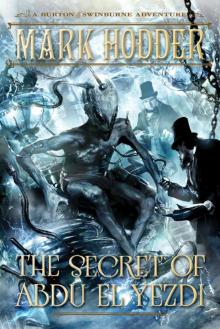 The Secret of Abdu El Yezdi
The Secret of Abdu El Yezdi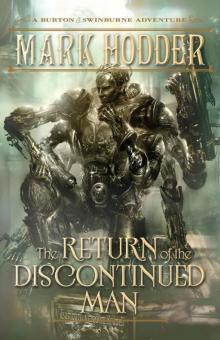 The Return of the Discontinued Man
The Return of the Discontinued Man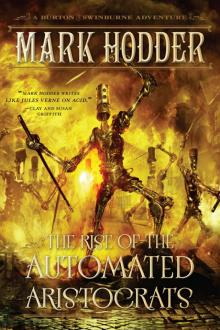 The Rise of the Automated Aristocrats
The Rise of the Automated Aristocrats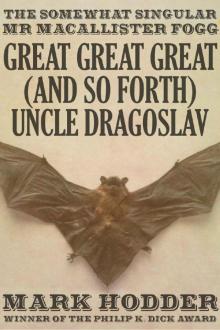 Macallister Fogg 2: Great Great Great (And So Forth) Uncle Dragoslav
Macallister Fogg 2: Great Great Great (And So Forth) Uncle Dragoslav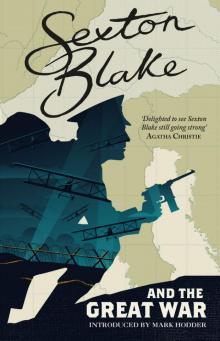 Sexton Blake and the Great War
Sexton Blake and the Great War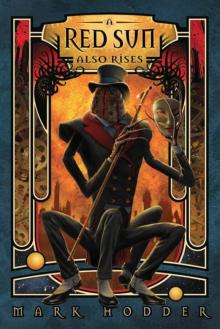 A Red Sun Also Rises
A Red Sun Also Rises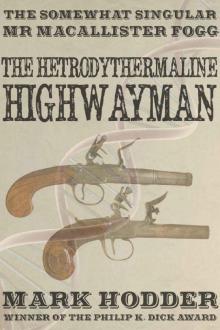 Macallister Fogg 3: The Hetrodythermaline Highwayman
Macallister Fogg 3: The Hetrodythermaline Highwayman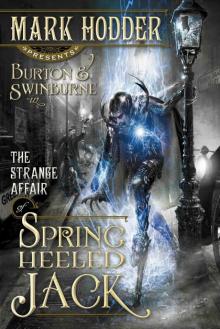 The Strange Affair of Spring Heeled Jack
The Strange Affair of Spring Heeled Jack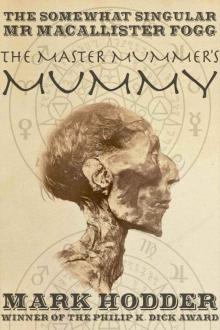 Macallister Fogg 1: The Master Mummer's Mummy (The Adventures of Macallister Fogg)
Macallister Fogg 1: The Master Mummer's Mummy (The Adventures of Macallister Fogg)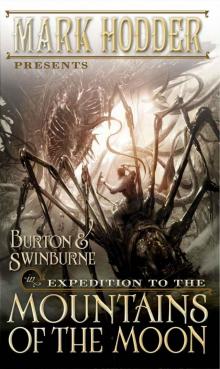 Expedition to the Mountains of the Moon bas-3
Expedition to the Mountains of the Moon bas-3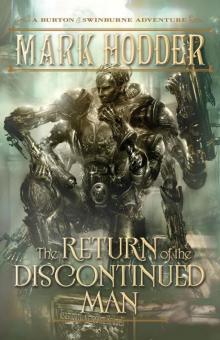 The Return of the Discontinued Man (A Burton & Swinburne Adventure)
The Return of the Discontinued Man (A Burton & Swinburne Adventure)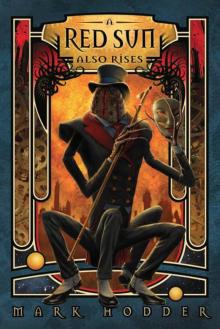 Red Sun Also Rises, A
Red Sun Also Rises, A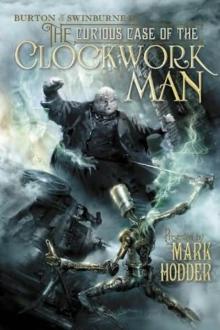 The curious case of the Clockwork Man bas-2
The curious case of the Clockwork Man bas-2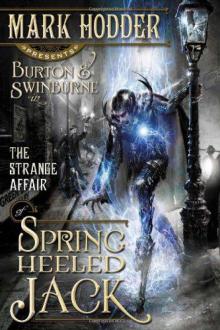 The strange affair of Spring-heeled Jack bas-1
The strange affair of Spring-heeled Jack bas-1